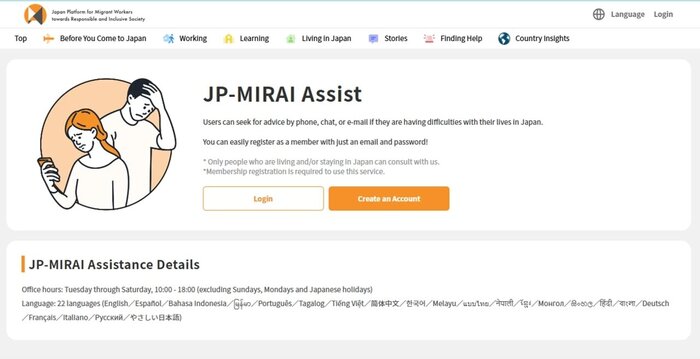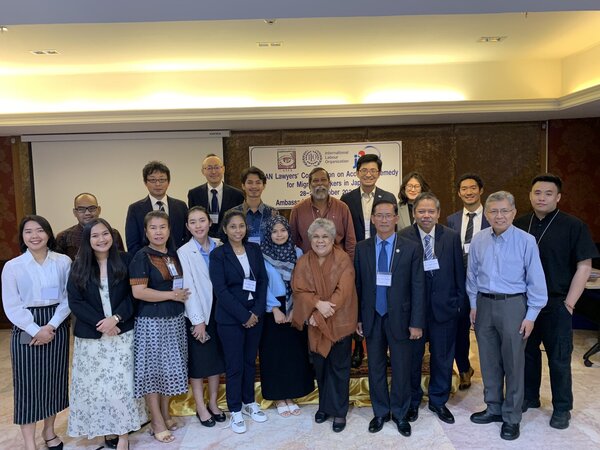- TOP
- 資料館
- FOCUS
- December 2024 - Volume 118
- Access to Remedy for Migrant Workers in Japan
FOCUS December 2024 Volume 118
Access to Remedy for Migrant Workers in Japan
Attracted by Japan's prosperity and motivated by desire for gaining higher income, migrant workers from Southeast Asia have been migrating to Japan since mid-1990s. This allure has significantly intensified in recent years, leading to a notable increase in migrant workers. As of mid- 2023, Japan hosted approximately 358,000 workers under the Technical Intern Training Program (TITP) and 173,000 under the Specified Skilled Workers (SSW) scheme, predominantly from ASEAN countries.
Challenges to accessing justice are widespread and impact all migrant workers, regardless of their status, skills, gender, or nationality. Migrant workers frequently lack awareness of legal procedures and services, including those available in their home countries. They may also fear legal and immigration authorities due to insufficient social support. Government officials and first points of contact, such as those at Labor Offices, Immigration Offices, and Police stations, often lack the expertise needed to handle complex cases of abuse and exploitation.
The absence of structured grievance mechanisms further exacerbates their vulnerabilities, hindering their ability to seek redress and protect their dignity. Further, financial barriers, including the high cost of legal and accounting services, deter many migrant workers from pursuing justice. Migrant workers often prefer non -state-based mechanisms for filing complaints due to the inefficiencies of state-based procedures. This preference underscores the urgent need for more accessible and effective complaint resolution systems.
Moreover, addressing post-return access to remedies is crucial, with demands for specific arrangements to ensure returned workers receive appropriate redress and support for cases of sexual or gender-based violence, and any other forms of abuse and exploitation. Japan provides various state- based and non-state-based services to support migrant workers. Japan Platform for Migrant Workers towards Responsible and Inclusive Society (JP-MIRAI), a multilingual information portal, offers valuable resources and support for resolving labor disputes. JP-MIRAI's referral system to the Tokyo Bar Association's Dispute Resolution Center further aids in addressing unresolved cases. Despite these efforts, significant gaps in public awareness and academic research persist.
The JP-MIRAI portal website
As Japan's labor market continues to evolve with an increasing number of migrant workers, it is imperative to engage in comprehensive studies and dialogues with lawyers, civil society organizations, and migrant workers themselves. This engagement is crucial for understanding and addressing the complexities of available access to remedy for migrant workers to Japan. The strong linkage with ASEAN bar councils and individual lawyers who consistently provide pro-bono legal assistance offers a unique opportunity to address these challenges more effectively.
Conducting dialogue/consultation on the challenges as well as available access to remedy in Japan and countries of origin is essential, as trends evolve and the scale of migration increases. By leveraging cross-border collaboration and enhancing legal capacity, we can advance the migrant rights agenda, ensuring that justice is not only sought but achieved. The continued partnership between lawyers, grassroots organizations, and stakeholders will be pivotal in identifying how the access to remedy works and how they can further enhance and assist migrant workers.
Linkage to the JICA-ILO Survey Project
The ASEAN Lawyers' Consultation on Access to Remedy for Migrant Workers to Japan was held on 28-29 October 2024 in Bangkok, following the consultation meetings and workshops held in Viet Nam and Cambodia in July 2024, and in Indonesia in October 2024 as part of the JICA-ILO project, Survey for Co-creating a Joint Work Plan for Improving Access to Remedy of Migrant Workers from Southeast Asia to Japan. This project aims to engage with wide international and national stakeholders in the migration corridors from Southeast Asia to Japan and develop a joint work plan with them to improve access to remedy for migrant workers.
The Bangkok workshop was attended by representatives of bar associations in Viet Nam, Cambodia and Indonesia [i] and also representatives of non-governmental organizations from Vietnam, Cambodia, Philippines and Japan. [ii]
Post-workshop Plans
After the workshop, The JICA-ILO Survey Project will consolidate inputs from the workshop into the joint work plan, as well as other inputs from the consultation workshops/meetings and pilot activities implemented in Cambodia, Viet Nam and Indonesia. The joint work plan will be finalized by the final regional workshop planned to be held in February 2025.
MFA seeks to enhance access to justice, due process, and equitable legal treatment for migrant workers, addressing their cases effectively. Align to its Justice for Wage Theft project, MFA advocates for accessible, efficient, and expedited justice mechanisms that migrant workers can utilize, even while they went back to their countries of origin. Filing a case should not impede their ability to work and reside in countries of destination.
For further information, please contact:
William Gois, Regional Coordinator, Migrant Forum Asia, mfa@mfasia.org
Akira Kawasaki, Technical Officer on Labor Migration, Regional Office for Asia a
[i] Hanoi Bar Association - Vietnam, Bar Association of the Kingdom of Cambodia and PERADI- Indonesia. The representative of the Integrated Bar of the Philippines was not able to attend the Bangkok workshop.
[ii] Center for Migrants Advocacy - Philippines, Serikat Buruh Migran Indonesia, Migrant Care - Indonesia, Legal Support for Children and Women - Cambodia, Ad Hoc Cambodia, Center for Development and Integration - Viet Nam, Lawyers Beyond Borders - Philippines, and HURIGHTS OSAKA.


